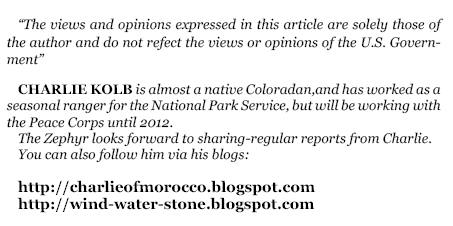The sun was especially hot one day last week. I was up early to watch the village wake up and to watch the clouds grow and shift, building up into the afternoon thunderstorms I have learned to expect daily at this time of year. I do have 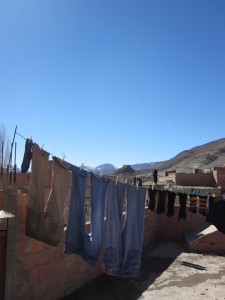 running water in my little house on the edge of the fields, but only for four hours a day, so I took advantage of it by hand-washing a substantial amount of laundry on my rooftop. Soon everything smelled of detergent and my roof began to resemble a yard sale of some sort—clothes hanging on lines or soaking in basins; a lone sock dripped water on me from above, a welcome respite from the heat of the day.
running water in my little house on the edge of the fields, but only for four hours a day, so I took advantage of it by hand-washing a substantial amount of laundry on my rooftop. Soon everything smelled of detergent and my roof began to resemble a yard sale of some sort—clothes hanging on lines or soaking in basins; a lone sock dripped water on me from above, a welcome respite from the heat of the day.
While this may seem somewhat mundane, and so it is for much of the year, I would like to stress that being awake, or even somewhat alive, in the mornings of Ramadan is unusual for me and most everybody else here. Ramadan, the month of fasting in the Islamic faith, is one of the strangest things I have yet encountered in my time here. No other event throughout the year so thoroughly affects my life, and the lives of those around me. Ramadan turns our world upside down.
It commemorates the reception of the Quran by the prophet Muhammad, via the angel Gabriel, and the entire month is set aside for fasting and prayer. The dates tend to vary, as the observance of Ramadan is based on the alignment of the moon and stars, and it is an average of ten days earlier each year, making a full cycle only a few times a century. Right now, and for the next few years, Ramadan will be in the summer months, a difficult time to fast in any form, let alone one that requires abstinence from food and water during the hottest part of the day.
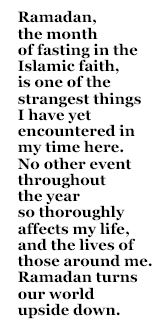 I find that the best way to learn about a custom so different from my own traditions is to practice it myself. So I am fasting throughout the day, along with my friends here in the village. Some people find this confusing. “If you’re fasting, why not convert?” is a daily question. Or “You aren’t muslim, why in the world are you doing this to yourself?”, also valid. I usually reply that I wish to understand more about their culture and besides, if my friends can’t eat or drink, why should I partake in what they cannot share?
I find that the best way to learn about a custom so different from my own traditions is to practice it myself. So I am fasting throughout the day, along with my friends here in the village. Some people find this confusing. “If you’re fasting, why not convert?” is a daily question. Or “You aren’t muslim, why in the world are you doing this to yourself?”, also valid. I usually reply that I wish to understand more about their culture and besides, if my friends can’t eat or drink, why should I partake in what they cannot share?
I am serious about the “cannot” part. If a Moroccan is caught eating, drinking, or smoking in public during the Holy Month, he can be fined or even jailed. The law tends to leave tourists alone, though the dirty looks they get from fasting locals should be discouragement enough. Add to that the fact that nearly everything is closed for much of the day and even government offices keep strange hours, always subject to change. Transport is even more of a nightmare and it arrives and departs irregularly, if at all. Traveling late in the day is ill-advised during the Holy Month, as a fasting brain cannot respond as quickly to the hazards presented by the dangerous mountain roads leading out of my village.
In the afternoons, nearly everyone moves about in somewhat irritable silence. I find that my language responds quite negatively to dehydration, and my Tamazight-Berber is often unintelligible close to the breaking of the fast. Near dusk, a calm hangs over everything, and even the looming mountains seem to be waiting, listening for something. Then it comes—a thin wail from the spire of the Mosque, half spoken, half sung; the Call to Prayer echoes down the valley, becoming a chorus as the first mosque in my village is joined by the tinny calls from the surrounding hamlets up and 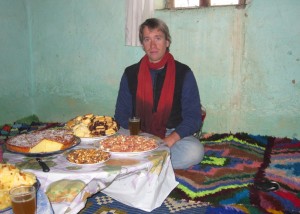 down the river. After the first line is said, the faithful roll out their mats to face Holy Mecca and bow their heads, lips moving in silent exultation and recitation of the prayers passed down by generations of their forebears. The rest of us tuck in to the spread at the break-fast table with gusto. It is traditional to start with dates and some sips of sweet mint tea, before moving on to heavier foods. I eat slowly; dates, fresh bread, eggs, and a Moroccan chickpea and lentil soup called harira that tastes strongly of cumin. Some of my friends, however, tend to eat like starving animals or human vacuum cleaners. I have been tempted to try to make a grab for their plate to see if they try to bite me. The end result of this is usually a distended stomach and a mild food-coma, like Thanksgiving dinner on a daily basis. The friend that I broke the fast with tonight, an otherwise very thin man, looked like he had swallowed a soccer ball after mowing through his meal in roughly five minutes.
down the river. After the first line is said, the faithful roll out their mats to face Holy Mecca and bow their heads, lips moving in silent exultation and recitation of the prayers passed down by generations of their forebears. The rest of us tuck in to the spread at the break-fast table with gusto. It is traditional to start with dates and some sips of sweet mint tea, before moving on to heavier foods. I eat slowly; dates, fresh bread, eggs, and a Moroccan chickpea and lentil soup called harira that tastes strongly of cumin. Some of my friends, however, tend to eat like starving animals or human vacuum cleaners. I have been tempted to try to make a grab for their plate to see if they try to bite me. The end result of this is usually a distended stomach and a mild food-coma, like Thanksgiving dinner on a daily basis. The friend that I broke the fast with tonight, an otherwise very thin man, looked like he had swallowed a soccer ball after mowing through his meal in roughly five minutes.
I haven’t yet learned to eat like this, but I give it the college try each time. I guess my friend has years of practice and this is only my second Ramadan. In the Islamic faith, people only begin fasting once they reach puberty. My host brother “Moha” is in his early teens and only started fasting this year, which means, strangely enough, that I have been fasting longer than he has. Kids can eat and drink during the day, so roving bands of them fill the streets when the sun is out. Their parents are off sleeping or working in the fields (a Ramadan task that I certainly do not envy), and as a result the kids tend to go more feral than usual, making the streets of my village resemble a scene from “Lord of the Flies”. While I may have said that Moroccans cannot break the rules of Ramadan, this is not to say that there is no cheating. It just occurs behind closed doors; unfortunately this door is usually my own. The other day my friend “Basu” came over and confessed that he had not been fasting for the past week and he needed somewhere to cook lunch; grudgingly I let him in and gave him the full run of the kitchen. I was flattered that he trusted me not to tell anyone, but the smells of food and tea drove me a little crazy.
The days of Ramadan tend to blur together, long periods of sleep followed by a starved and listless wakefulness, followed by the rapid gratification of break-fast and the socializing thereafter, and a brief period of sleep before the cycle begins again. Some nights I didn’t fall asleep until four or five o’clock in the morning, waking around noon or one o’clock to wait out the afternoon in silence and solitude. I found that my language doesn’t tend to work to well in the afternoons as well as the fact that I am not usually in the best of moods after so long without water. This changes, however, when I have visitors—those of the English-speaking persuasion. There are other volunteers near me, three within an hour if the transport is running. One is my contemporary (we have both been here 18 months) and the other two are new, replacing the volunteers that had taught and mentored me for the better part of last year. I see at least one of them once a week or so; they come up to check their mail and deal with any request the government officials may have of them, since they are headquartered in my village. Occasionally, a brave (very brave) tourist will putter into town in a land-rover and attempt, with little success, to find any shops or cafés open before sundown.
I met three such tourists, teachers from Barcelona, one night at the café that I frequent. I was sitting at the table watching my friend mow through his meal, and these three came in and surprised me by speaking English to me! I have learned not to hope for English when I see other foreigners here, most people who come to Morocco tend to speak French, so this was an unexpected pleasure. They ate with us and, after awhile, one of the women asked me rather sheepishly whether there was any place where they could find a European meal in the village. They had been in Morocco for a substantial period of time, and were craving something other than tagine, cous cous, or harira which is pretty much the trifecta of foods found in any café here. Despite the monochromatic palette of café cuisine, and the fact that there are at least ten cafés here, they never seem to try to compete with each other. I guess this happens in a country where there is literally no such thing as a fixed price. I looked at the woman who asked me this question and, instead of replying with an emphatic no and a laugh, I said “Yes there is, if you come to my house tomorrow night after the Call to Prayer.” The following night they all showed up hungry, and I served them spaghetti alfredo with lots of garlic accompanied by French-press coffee and the Moroccan edition of chebekkia (a kind of honeyed Moroccan pastry) and dates. We stayed up late and spoke lots of English, just another snapshot from the long nights of Ramadan.
On another occasion an American friend of mine, who used to work in Er-Rachidia as an English teacher with the Fulbright program but is now moving to Fes to improve his Arabic, came to visit for five-days. The ex-pat community is pretty tight-knit here in Morocco, and it’s not unusual for the social circles of most city volunteers to have American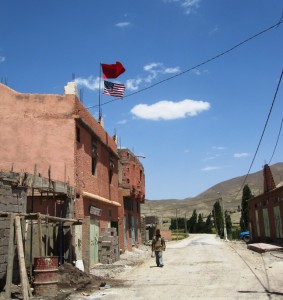 friends from other programs that they see on a regular basis. I was in Er-Rachidia many times last winter to escape the cold monotony of village life, (all that shivering gets tiring after awhile,) and I usually stayed with this “Fulbrighter,” who was an excellent host and became one of my dearest friends in country. It was great to have him here, finally, and he was completely content with lots of socializing as well as fasting with me. Granted, most of our activity during the day was to lie around and fantasize about American foods that we missed. He left a few days ago in one of the last vans to leave before the feast began and I still miss having his company.
friends from other programs that they see on a regular basis. I was in Er-Rachidia many times last winter to escape the cold monotony of village life, (all that shivering gets tiring after awhile,) and I usually stayed with this “Fulbrighter,” who was an excellent host and became one of my dearest friends in country. It was great to have him here, finally, and he was completely content with lots of socializing as well as fasting with me. Granted, most of our activity during the day was to lie around and fantasize about American foods that we missed. He left a few days ago in one of the last vans to leave before the feast began and I still miss having his company.
The feast is today and Ramadan ended last night. I broke fast alone, which can be nice sometimes, and made ginger-snaps with a friend of mine who sat there watching me while smoking my tobacco out of my hookah. Most Moroccan men here in the village are not used to cooking, so he watched me with mild interest and was happy to sample the finished product. I didn’t feel like cooking, but I knew the feast was tomorrow and that I needed to bring a gift of overly-sugared food. My friend left after the cookies were done (and all of my tobacco had been smoked) and I went to bed.
I awoke to one of the most beautiful mornings I have yet seen in the Atlas. The sky was ice blue, while the mountains were gilded by the honeyed early-morning light. It was clear and still and cool, and only a few people were out and moving. We greeted eachother with cries of “M’bruk l’washur!” (felicitations for the feast!) and smiled broadly, enjoying the sunlight and the promise of daylight eating. I arrived at my host family’s house on the hill just as the kids were leaving and I shook hands with everybody, offering my salutations, including a few kids I didn’t know. As I entered the door, one of the older kids said “He speaks Berber?!” I was pleased to hear my host brother reply with something that most closely translated to “Duh…”
I was greeted warmly by my adopted Moroccan parents, who sat me down and plied me with tea while I supplied them with ginger-snaps; my host-mother loves my ginger-snaps. After a time, my host uncle “Said” joined us, resplendent in a white jelaba robe. My best friend here, “Haddou”, is Said’s son, and I spend most of my time with him, usually in cafés or either of our houses. His parents have also taken me under their wing and I have heard his mother say on numerous occasions that I am “misskin” or poor. She then explains that she says this not because I have no money, but because I have no family here. She uses my constant state of “misskinity” (please forgive the Tamglish) as an excuse to feed and coddle me at frequent intervals; attention that I will gladly take, especially in the winter.
Said looked at me and said that I should come to his house because Haddou would be disappointed with me if I didn’t. I was surprised, as I had expected to spend a majority of the day with my host-family like last year. My host dad smiled and told me to go with his brother; my host-mom smiled too, so I could tell she was not offended. I soon arrived at Said’s house and Haddou came out of one of the rooms rubbing sleep from his eyes. He smiled when he saw me and he put his arm around my shoulders asking after the health, welfare, and sanity of his “big brother” as he calls me. He steered me into the sitting room and I plopped down on a rug while his mother began to ply me with cookies and more tea. As I looked at her beaming at me, cookie in hand, I saw that Haddou was also smiling. I grinned back, “felicitations for the feast!” I said, and as the morning sunlight streamed in, illuminating the beautiful table of food, the intricate carpets on the floor, and happy faces of my new-found family, I realized what a wonderful place this still is to me and that the remaining 8 months here will fly by far too fast.
To read the PDF version of this article, click here: oct11-16-17
Don’t forget the Zephyr Ads! All links are hot:




